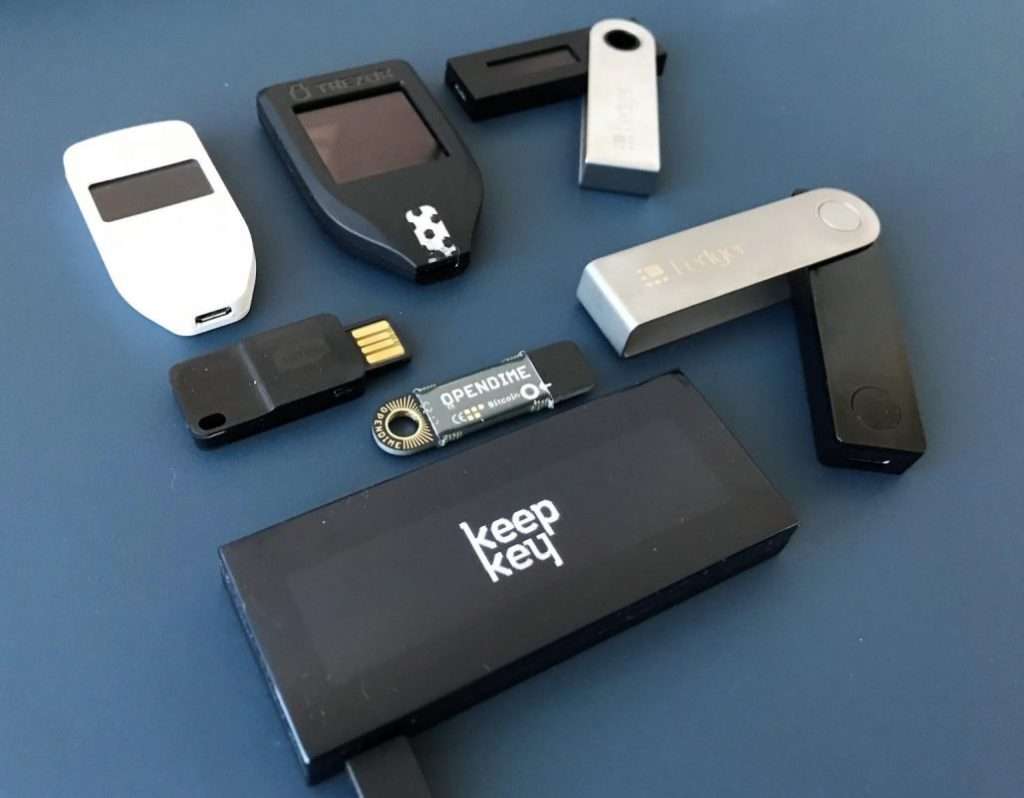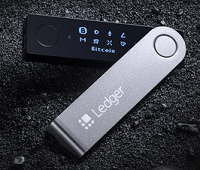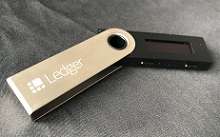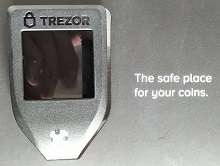With Bitcoin’s “little brother”, Litecoin, the selection of wallets is at least as large as with BTC. So that you can find the right wallet for you, we have created this guide, which presents you the best Litecoin wallets, sorted according to the type of wallet. To help you understand the differences between the individual wallets, we would like to give you a brief introduction to the topic. The most basic distinction is that between a
- cold wallet and
- hot wallet.
The difference between both types is the connection to the Internet. Cold wallets carry that name because they have no connection to the Internet. On the other hand, hot wallets have a permanent connection to the Internet, which is why they are considered unsafe in regards of security reasons. This is because hot wallets can be attacked by hackers via the Internet connection. cold wallets doesn’t have this point of attack for hackers.
The security of cold wallets is therefore much safer than that of hot wallets. This is also the reason why large crypto investment companies and cryptocurrency exchanges store the majority of their customers’ money on cold wallets.
You should take this as an example! In the private customer segment, cold wallets can be purchased in the form of hardware wallets or created in the form of free paper wallets. The former are devices that are usually not much larger than a USB stick and can be used to manage Bitcoin and various Altcoins.
You should also know that the hot wallets can also be divided into various other subcategories. These types have in common that the “Private Keys” are stored on different media. The subcategories of hot wallets are:
- Litecoin desktop wallets
- Litecoin mobile wallets
- Litecoin online wallets
A private key is a randomly generated string that represents the ownership of the cryptocurrency and allows you to send Litecoin. Therefore the private key must never be passed on. If you control the private key, you can also access the associated address and send the associated LTC.
The wallet address is a hash version of the public key, which cannot be reversed thanks to cryptography. In contrast to the private key, the public key or wallet address is not secret. .
We’d also like to give you two pieces of advice first: Before you buy Litecoin (click here to read our guide), you should know which wallet you would like to use for storing Litecoin (LTC) in order to provide the external wallet address during the purchase process. This will allow you to save time and fees if necessary.
You should also be aware that storing your Litecoin (LTC) on the wallet of an exchange or broker is always the worst and least secure alternative. If you choose to do so, you give control of the private key to the trading platform. Our advice is therefore to set up an external wallet and to manage the private keys yourself.
Litecoin hardware Wallets

Hardware wallets are the de-facto standard when it comes to the secure management of large amounts of cryptocurrencies. Compared to all other wallet types they have the highest safety standard as cold Wallet! Litecoin’s private key does not come into contact with the Internet in a hardware wallet.
This is exclusively stored on the hardware Wallet! This means that the private key is not connected to the Internet even if an LTC transaction is released – the release takes place on the device. hardware wallets are thus very effectively protected against phishing attacks and other malware, as only other components of the hardware wallet are connected to the Internet. A theft of the Litecoin private keys from the hardware wallet is almost impossible.
In addition, hardware wallet also provide very good protection if the device itself is stolen. The hardware wallets presented below all have an additional authorisation by means of a PIN. In addition, some hardware wallets have the ability to set up an additional layer of security through 2-factor authentication. This makes the devices very difficult to hack even in the event of theft.
From our point of view, the purchase of a hardware wallet is always recommended if you invest larger amounts in Litecoin. Even the price for our test winner, the Ledger Nano X (around 120 euros) is probably rather low compared to the amount you probably invested. In the following box we have summarized the advantages and disadvantages of hardware wallets:
✅ Storage of private keys offline
✅ hardware wallets mostly support numerous cryptocurrencies
✅ Regular updates by the renowned hardware wallet manufacturer
✅ Physical confirmation is required on the device for each transaction.
✅ Very good customer support with the renowned manufacturers
❌ Storage of the coins is your own responsibility. However, this can also be an advantage!
In the following we introduce you to five Litecoin hardware wallets. If you would like to know more about the individual wallets, we recommend that you read our detailed test reports on the hardware wallets.
1.Ledger Nano X
In our comparative test, in which we tested 8 different hardware wallets, the Ledger Nano X became our test winner. This model is the successor to the Ledger Nano S. Ledger’s successful model has been sold more than 1.3 million times worldwide.
In May 2019, after several years, Ledger launched a significantly improved model with numerous new features. The biggest and most popular innovation is the Bluetooth function, with which the Nano X can be connected to a smartphone. Via the Ledger Live App the wallet can be operated like a mobile Smartphone Wallet, only that it offers the same security as a cold wallet.
In addition, the Ledger Nano X has three more new functions or changes. It has a much larger memory than the Nano S, and can manage up to 100 cryptocurrencies simultaneously. Furthermore, the display was slightly enlarged. This means that Litecoin addresses can now be shown on the display without scrolling, which makes it much easier to check the LTC address. Finally, an improved safety chip was also installed.
Conclusion: From our point of view there is no hardware wallet for Litecoin that can compete with the Ledger Nano X in terms of functionality and ease of use!
2.Ledger Nano S
Even though the Ledger Nano S is no longer Ledger’s newest model, there are still good reasons to buy it. The Nano S continues to be one of the most secure hardware wallets on the market. Those who can do without the new and extended functions of the Nano X and only want to manage a small number of different cryptocurrencies, e.g. only Litecoin and Bitcoin, will receive a hardware wallet with an unbeatable price/performance ratio (at a current price of 59 EUR).
3.Trezor Model T
Almost at the same time as the Ledger Nano X, SatoshiLabs also presented its successor for the Trezor One in May 2019. Just like the Nano X, the Trezor Model T comes with some new features and improvements that make the wallet one of the best on the market. The Trezor Model T, for example, has a touch screen on which all transactions must be confirmed. In addition, the firmware (Trezor Core) has been completely revised and improved for security reasons.
Furthermore, the Model T has a faster processor, so that the operation runs even smoother. In addition, there is a micro SD card slot for data encryption and a modern USB-C port for connecting to a computer. Compared to the Trezor One, the Model T can thus be classified as a premium version of SatoshiLabs.
In a direct price/performance comparison, however, the Ledger Nano X performs better. The Nano X is much cheaper than the Trezor Model T and also has the better complete package. This makes the Ledger software a little easier and more intuitive to use. In addition, the Nano X has a few more functions. Nevertheless, the Trezor Model T is an excellent hardware wallet, which also has some advantages over the Nano X.
4.Trezor One
The Trezor One was launched in 2014 by SatoshiLabs and is the oldest hardware wallet on the market! According to SatoshiLabs it should be the most trustworthy and secure hardware wallet in the world.
It is a fact that the Trezor One has already been sold over a million times, which clearly speaks for the quality of the wallet. Due to its low price, the Trezor can be a very inexpensive and good alternative to more expensive hardware wallets, especially for newcomers.
5.Digital Bitbox
The Digital BitBox is a cheap and very small hardware wallet which supports Litecoin as well as Bitcoin, Bitcoin Cash, Ethereum, Ethereum Classic and all ERC20 tokens. The minimalist device generates a wallet (bip32) during the starting process by the integrated microcontroller. A very practical security feature is the slot for a micro SD card, which can be used to create an offline backup for recovery.
You should know this about hardware wallets:
Litecoin desktop wallets
Desktop wallets belong to the hot wallets. As the name suggests, this type of wallet is a program (software) that is installed on a computer to send and receive Litecoin.
Compared to online wallets, they offer the significant advantage that the private keys are not stored on a company server but on the user’s own computer. Thus they offer the possibility to keep the sole control over your Litecoin without having to buy a hardware wallet.
However, there is also a certain responsibility involved. Since the private keys are stored on your own computer, it is essential to keep your computer up to date with updates and good anti-malware software.
Due to the (presumably) permanent connection to the Internet, there is an increased risk of becoming a victim of a phishing attack, for example. Nevertheless, the protection is significantly higher compared to online and web wallets. desktop wallets are from our point of view the best alternative if you are looking for a free wallet for Litecoin.
Below we give you an overview of the best desktop wallets for Litecoin in 2019, but first of all we would like to present you again the advantages and disadvantages of desktop wallets compared to the other types of wallets:
✅ No acquisition costs – use is free of charge
✅ Regular updates
✅ Each transaction must be confirmed manually.
✅ High safety standard
❌ No deposit insurance, e.g. with the eToro Wallet
❌ Be careful when choosing an unknown wallet: There are known cases of fraud.
Below you will find our top recommendations for a safe and serious Litecoin desktop Wallet:
- Electrum LTC
- Guarda Wallet
- Atomic Wallet
- Jaxx Liberty
- Exodus Wallet
- Litecoin Core Wallet
1.Electrum LTC Wallet

The Electrum LTC wallet is a fork of the very popular Bitcoin Electrum wallet (which is also our top recommendation for a Bitcoin Wallet). The code for the Electrum Bitcoin wallet was already released in 2011 and was later forced (adapted) as Litecoin version. It is important to know that the Electrum LTC is not an official product of Electrum Technologies GmbH, but a joint project of various developers who have developed the wallet as open source software on a desktop basis.
In contrast to the Litecoin Core Wallet, the Electrum LTC wallet is a lightweight client that does not require the download of the entire Litecoin blockchain, but uses a specialized server that indexes the blockchain. This makes the wallet available immediately after the download.
As a deterministic wallet, the Electrum LTC wallet also provides very good protection by offering the ability to create a 12-digit seed passphrase. In addition, the private keys and the seed are stored encrypted on the hard disk of the computer and are not passed on to third parties (e.g. the Electrum servers).
The design of the Electrum LTC is simple and intuitive. Nevertheless, the wallet offers numerous functions, so that it is suitable for all users from beginners to advanced. It is also practical that the same wallet can be used on separate systems as the wallet synchronizes itself automatically.
The Electrum LTC is available for Windows, Mac and Linux and can be downloaded from this link (click).
2.Guarda Desktop- and mobile Wallet

The Guarda Wallet offers the possibility to store and manage more than 50 different cryptocurrencies, including Litecoin. The Wallet is available as desktop and mobile version. There is also a Google Chrome extension. In addition, Guarda also offers a web wallet, which is the least secure of the options available.
The download as well as the first setup is fast and easy. The subsequent use is completely free of charge, only the normal network fees for sending transactions of the Litecoin Blockchain apply.
Your private keys are stored on your computer or smartphone so that only you have access to them. Make sure you use an up-to-date virus program so that hackers and phishing attacks are detected early in an emergency.
The Guarda Wallet has a built-in feature that allows users to purchase cryptocurrencies by credit card. Guarda works together with the payment service provider Simplex (Binance and KuCoin also use Simplex). In addition, a connection can be established with the Ledger Hardware Wallet when using the Web Wallet.
You can download the wallet from Guarda’s official website.
3.Atomic wallet

The Atomic wallet is a Multi-Coin-Wallet, which can manage more than 300 different cryptocurrencies and is available as desktop as well as mobile version for the smartphone. The developers of the Atomic wallet have focused their development on security, anonymity and decentralization.
As a result, the Atomic wallet is also very popular, although it was not launched until 2017. Another advantage of the wallet is that it is published by the well-known developer, Konstantin Gladych, who is also CEO and co-founder of the crypto exchange platform Changelly.com.
In accordance with the focus on security and anonymity, the wallet stores the private keys as well as the transaction data encrypted on its own computer. Neither the developers nor other third parties have access to this data. A very useful function, from which the wallet gets its name, are the Atomic Swaps.
These enable the direct exchange of (supported) cryptocurrencies between two persons, peer-to-peer, without an exchange platform being involved. For cryptocurrencies that cannot yet be exchanged via Atomic swaps, the wallet provides the possibility to use Changelly or ShapeShift from the wallet to exchange cryptocurrencies.
Our experience with the Atomic wallet is consistently positive. Especially if you are looking for a Multi-Coin-Desktop-Wallet which also supports Litecoin, the Atomic wallet is our top recommendation.
You can download the wallet under this link. It is available as desktop version for Windows, Mac, Ubuntu, Debian and Fedora. There are also mobile versions for iOS and Android in the respective App Store.
4.Jaxx Liberty wallet

The Jaxx Liberty is a wallet, which can manage 80 different cryptocurrencies and is available as desktop and smartphone version. Both the predecessor and the new version with the suffix “Liberty”, which was released in 2019, were developed by Anthony Di Iorio, a co-founder of Ethereum. Due to its famous name – Di Iorio – the wallet enjoys an excellent reputation in the crypto scene.
But not only because of that the Jaxx Liberty wallet is very popular, but also because of its numerous functions, as well as the good security. As with the Atomic Wallet, neither the developers nor third parties can access your “private keys”. These are encrypted and stored locally on the user’s computer.
Very important is also the easy way to create a backup in case your computer breaks down. Another advantage of the wallet is its outstanding support, which is highly praised in numerous online forums and is available around the clock.
If you want to download the wallet, you can click this link to the official website where both the desktop and mobile versions and a web browser version are available. You can choose between a Mac and Windows version, as well as a browser extension for Google Chrome. You can also download the mobile versions for your Android or iOS smartphone from the App Store.
5.Exodus wallet

The Exodus wallet is a Multi-Coin Wallet, which was launched in July 2016 by Daniel Castagnoli and JP Richardson. Since then the Exodus wallet has firmly established itself in the crypto market and developed a large user community. The wallet is particularly popular because it is very easy and intuitive to use.
It was also one of the first known multi-join wallets. Currently, the Exodus wallet can send and receive more than 100 cryptocurrencies and display their values in over 30 different Fiat currencies.
The wallet has three main components that are very practical and easy to use:
- the Multi-Coin Wallet,
- a portfolio tracker (in 30 Fiat currencies)
- and an integrated exchange service from Shapeshift.
A very big advantage of the Exodus wallet is also very good customer support. In addition to an extensive FAQ area (including videos) there is the possibility to contact the Exodus team via e-mail, Twitter, Facebook and Slack channel. Furthermore, the security of the Exodus wallet can also be rated as good. Neither the developers nor other third parties have access to your “private keys”. These are encrypted, stored locally on your computer.
In the crypto community, however, there are two criticisms of the Exodus that we don’t want to withhold from you. Firstly, the backup function via e-mail is criticised because, although this is very convenient for the user, it also represents a security vulnerability. Second, the Exodus wallet does not have two-factor authentication. If both “problems” are considered together, hackers “only” have to crack the password, e.g. using a keylogger. Afterwards they already have full access to the wallet.
If you consider this to be uncritical, you can follow the link below which will take you directly to the Wallet’s download page (click here!). The wallet is available as desktop version for Windows, Mac and Linux. Smartphone versions for iOS and Android are also available.
6.Litecoin Core wallet
The Litecoin Core wallet is the official full node client of the Litecoin project, which is supported by the Singapore-registered Litecoin Foundation and led by the directors Charlie Lee, Xinxi Wang and Franklyn Richards. The wallet, which was formerly known as Litecoin-QT, is aimed exclusively at advanced crypto investors and Litecoin miners.
Since the wallet is the Full Node Client, the entire blockchain must be downloaded and permanently synchronized, so appropriate hardware is required. The advantage of the Litecoin Core wallet is that, unlike other wallets, all protocols and rules required for accessing the Litecoin blockchain are implemented. It is also open source software that is regularly updated by the Litecoin development team to make it easier for anyone to use and more stable and secure.
The range of functions includes all the functions you would expect from a wallet. The wallet can be used to store, send and receive LTC and to view the transaction history. Furthermore, the Litecoin-Wallet can be encrypted for additional security and thus the private and public keys can be securely stored on your own computer.
The Litecoin Core wallet is available for Windows, MacOS and Linux and can be downloaded from this link.
Mobile Litecoin wallets
Mobile wallets have the advantage that, as the name suggests, they can be installed on ordinary smartphones. So you can access and send your Litecoin from any place in the world where there is an internet connection via smartphone.
Technically, mobile wallets have a lot in common with desktop wallets. So the private keys (usually) are also stored encrypted on your device, here your smartphone. Many desktop vendors now also offer a version for the smartphone.
Due to these similarities, however, they have the same problem as desktop wallets: There is a permanent Internet connection, through which hackers can access the private key. This topic is exacerbated even further with smartphones, because many users use public hotspots in cafés and restaurants, for example, where data is usually transmitted unencrypted.
This is another reason why it is particularly important to protect your smartphone with regular updates and, if necessary, anti-malware software. On the other hand, they also offer the same advantages as desktop wallets. In the following we have created an overview:
✅ Access to the wallet from anywhere where there is an Internet connection
✅ More cryptocurrencies than just Litecoin are often supported.
✅ The user interface is often very simple and intuitive.
✅ If you have any questions, please contact customer support.
❌ No deposit insurance, as offered e.g. by eToro Wallet
❌ Vulnerable to hacker or phishing attacks
- Loaf Wallet
- Atomic Wallet
- Jaxx Liberty Wallet
- Coinomi Wallet
- Edge Wallet
1.LoafWallet

The LoafWallet is the official mobile wallet for the cryptocurrency Litecoin, which was launched by Charlie Lee, the inventor of Litecoin and is now being further developed by the Litecoin Foundation. It is an independent Litecoin Wallet, which can only send and receive Litecoin (LTC) and is now available for free download for both iOS and Android in the respective App Store.
A big advantage of the LoafWallet is that it is developed by the Litecoin Foundation. Because of this the wallet is always up to date and is regularly updated. No personal data is required to download the wallet.
In addition, it also has good privacy, since the private keys are stored exclusively on the user’s terminal device and not on external servers. In order to increase the security of the LoafWallet, users can create a PIN and passphrase to have a backup option in case the terminal device breaks down.
Another plus point when considering security is that the Loafwallet has no servers that can be hacked or go offline, so users can access their money anytime, anywhere. The LoafWallet connects directly to the Litecoin network and also offers strong performance with “Simple Payment Verification” (SPV mode). Very simple and useful is also the feature to import existing Litecoin wallets quickly and easily. In case of problems there is also a reliable support which can be contacted on Twitter, Google+ and Reddit.
2.Atomic wallet

As with the desktop Wallets, the Atomic wallet is our Top 2 recommendation in the wallets category for your smartphone. The wallet is especially useful if you are looking for a Multi-Coin-Wallet which is not only able to manage Litecoin. The mobile version of the Atomic wallet is the same as the desktop wallet.
Accordingly, it also offers the same advantages. Thus over 300 different cryptocurrencies can be managed. In addition, the private keys and transaction data are stored encrypted on your smartphone. This means that neither the developers nor other third parties have access to it. The smartphone version also has Atomic swaps, as well as the option of using the exchange services of Changelly or ShapeShift.
You can download the wallet from the official website. In addition there are the iOS and Android versions in the respective App Store.
3.Jaxx Liberty wallet

The mobile version of the Jaxx Liberty wallet is identical to the desktop version, except that it is programmed for iOS and Android. Accordingly, the security and anonymity of the mobile Jaxx Liberty wallet can also be classified as very good.
Neither the developers nor third parties have access to your private keys, as they are stored encrypted on the user’s smartphone. In addition, the mobile version also offers a very simple way to create a backup. Otherwise, the same advantages from the description of the Jaxx desktop Wallet apply.
You can download the versions for your Android or iOS smartphone from the App Store.
4.Coinomi wallet

The Coinomi wallet is also a Multi-Coin-Wallet, which is suitable for iOS and Android operating systems and can store Litecoin (LTC) and over 275 other cryptocurrencies. It is one of the oldest multi-join wallets on the market and was released in 2014. Since the release, both the desktop and mobile versions have been downloaded by over a million users.
In addition to the very large number of coins, the wallet scores particularly well in the area of privacy. Besides the usual features for a good privacy – the private keys and transaction data are stored locally on your device – the wallet offers an integrated encryption for the IP addresses of the users.
Another useful function is the connection of the wallet to the Coinomi cryptocurrency exchange of the same name. Thus cryptocurrencies can be traded directly out of the wallet. However, there is also a point of criticism with the Coinomi wallet. It doesn’t offer two-factor authentication. Beyond password protection, a second security layer is therefore lacking. If attackers succeed in hacking the user’s computer, a keylogger is sufficient to steal the password and thus gain full access to the wallet.
If you want to use the wallet, you can download it from the official website (click!).
5.Edge wallet

The Edge wallet is only available for Android and iOS. In addition to Litecoin, it can manage 17 other cryptocurrencies. A feature that sets the wallet apart from other competitors is the possibility to transfer US dollars and euros to the wallet and thus buy Litecoin. In addition, it has a good safety standard.
This allows 2-factor authentication, a PIN and a Touch ID to be set up to protect the account. Very practical for owners of several smartphones is also that the wallet can be used from several end devices.
To download the wallet you can visit the official website of the Edge wallet (click!).
However, this advantage also entails a certain responsibility, since you must protect the private key in the best possible way. Since your smartphone is probably (almost) permanently connected to the Internet, it can be infected with malware that is aimed at stealing your private keys and your litecoin (LTC). Therefore you should update your smartphone regularly and install good anti-malware software if necessary. With this you can greatly reduce this risk. Our top recommendation for a mobile wallet is the official LoafWallet for Litecoin. .
Litecoin online wallets
Litecoin Online wallets offer an even simpler way to manage Litecoin than the previously introduced wallets. Online wallets have the great advantage that there is no need to set up, install or create a backup and only one login is required. Basically, online wallets can be grouped in two ways.
The first type are the accounts (wallets) on a cryptocurrency exchange. These offer the considerable advantage that the user does not have to worry about anything. The major disadvantage is that they require a high level of trust in the trading platform.
The users of a Exchange wallet must be confident that the platform will store the cryptocurrencies in cold storages and that the IT infrastructure will not be hacked. In addition, the employees who have administrative access must be trusted. At this point we would like to mention Mt. Gox Hack, which may have been an inside job (which could never be clarified). Well-known exchanges and brokers generally have very good security measures for each of these points of attack. However, exchange wallets are not very recommendable for the permanent storage of Litecoin.
The second type of online wallets are Litecoin specific developments. The LiteVault is probably the most popular and best-known Litecoin Online wallet. Below we have compiled an overview of the advantages and disadvantages of online wallets:
✅ Exchange wallets enable trading out of the Wallet
✅ In the case of exchange wallets, there is no installation work required.
✅ You can define limits for maximum payouts per transaction.
✅ The user interface is often very simple and intuitive.
✅ Often very good customer support
❌Die Management of private keys (often) transferred to a third party
❌ Greater likelihood of hacking or phishing attacks
❌ Some web wallet vendors have turned out to be SCAM in the past.
- LiteVault
- Binance
- eToro
- Litebit
1.LiteVault

LiteVault is an online wallet that was developed especially for Litecoin and features an open source design. It is practically an online wallet service that uses in-browser cryptography to store the LTC and is based on the same system as Blockchain.info. With LiteVault Litecoin transactions can be sent and received. It also offers integration with Changelly, allowing users to purchase LTC by credit card and exchange it with other Altcoins.
Technically, the wallet works as follows: When you log in to LiteVault, your web browser sends your identifier to a LiteVault server that returns the encrypted version of the wallet using the AES algorithm. Your browser decrypts this data with your password (which is never sent to the server) to load your private key to sign transactions.
When you perform a transaction, LiteVault uses the private key stored in the browser’s memory. After signing with the private key, the transaction is transferred as a hash to the LiteVault server, which forwards the transaction to the Litecoin network.
LiteVault is developed by Someguy123, who writes to himself on the official website:
I am a trustworthy website developer within the Litecoin community who is responsible for various services including the Litecoin Block Explorer and the administration of various official Litecoin resources such as Wiki and IRC:
2.Binance wallet

Managing Litecoin (LTC) on Binance can also be an option if you intend to trade cryptocurrencies. Over 150 cryptocurrencies can be traded out of the wallet on one of the world’s most popular exchanges. However, since this is a exchange wallet, you must be aware that you are handing over the management of the private keys to Binance, which will store them for you.
The security of the Binance Web wallet can therefore also be classified as significantly lower than that of the wallets presented above. This has two main reasons in our opinion: First, your private keys are located on external servers. Secondly, Binance is a popular target for hacking attacks.
Binance is one of the safest exchanges in the world. Nevertheless, the market has already been hacked, with a total of 7,000 BTC being stolen in May 2019. Even if Binance has assumed full responsibility and has therefore not passed on the loss to its customers, this shows the vulnerability of online wallets.
We therefore recommend that you only use the Binance wallet as long as you are actively trading cryptocurrencies. If you are looking for a long-term storage option, you should send the LTC to an external wallet.
If you would like to register an account on Binance, you can do so via this link*.
3.eToro wallet

Our second choice is eToro, which, however, only appeals to residents outside of the US and UK (as of 01/2021). eToro is one of the largest CFD providers in the world and offers various cryptocurrencies in “physical form” as well as CFD (outside of the two aforementioned regions). Due to its high security standards and reputation, eToro can be a good option for custody in our view.
For more information, you can read our eToro review. If you want to sign up for the wallet, you can use this link (click here*) to create an account with eToro.
**68% of retail investor accounts lose money when trading CFDs with this provider. You should consider whether you can afford to take the high risk of losing your money.
Cryptoasset investing is unregulated in some EU countries and the UK. No consumer protection. Your capital is at risk.
4.Litebit wallet

For the direct purchase and sale of Litecoin (LTC) Litebit is our top recommendation for investors from Europe. In addition to the brokerage service, the platform also offers a wallet to store Litecoin. Here you have to keep in mind that Litebit manages the private keys (according to the classical definition of a exchange web wallet).
While Litebit stores large portions of customer funds in cold Storages (offline) and provides 2-factor authentication for user accounts, Litebit does not provide a single point of authentication for all customer accounts. Nevertheless you should keep the Litecoin on the Litebit wallet for a short time only. We recommend you at least install a free desktop wallet or better still buy a hardware wallet.
If you want to buy Litecoin, just click on this link*. You will be directed to the official website of Litebit where you can register.
In the following we have summarized the most important aspects of the use of Web Wallets:
Litecoin specific online wallets (e.g. LiteVault) have the advantage that you own the private keys. Nevertheless, the private keys are connected to the Internet and are stored in the web browser. Therefore, it is very important to install anti-malware software in order not to become a victim of a phishing attack or keylogger.
Overall, online wallets offer the lowest security standard and should therefore not be used permanently.
Litecoin paper wallets
Litecoin Paper Wallets can be a very good option if you want to save LTC offline and don’t want to buy a hardware wallet. By “storing” the password, the address and the private key on a piece of paper, the sensitive data will not be connected to the Internet. Only when you want to send a transaction do you have to use another wallet.
Since your private key then comes into contact with the Internet, you should then create a new Paper wallet. However, this process can be somewhat cumbersome for many transactions. From our point of view Litecoin Paper wallets are therefore always useful if you do not want to access the Litecoin (LTC) for a longer period of time.
✅ Best suited for beginners
✅ Easy and fast to create
❌Scam Danger! Only serious providers like liteadress.org should be used.
❌ Not 100% safe from hacker or phishing attacks (as soon as you use another wallet)
1. Best Litecoin paper wallet: LiteAdress

LiteAdress is a service that generates a private litecoin key and an address. After the generation you can print the key and the address and keep the note offline, so that no hacker can gain access to your Litecoin (LTC). It is important that your PC and printer are free of viruses and malware. This can be a potential weak point of the Litecoin paper wallet.
If you use Litecoin Paper Wallets, you should note the following:
Further important information about the Litecoin wallet test
Please also allow us a final piece of advice: Please note that we have gathered the information to the best of our knowledge and experience. However, despite all efforts, you should always gather further information and test different wallets to find the best wallet for you.
If you have questions or suggestions about our Litecoin wallet review, please leave us a comment. We’ll be glad to help you!
Subscribe to our daily newsletter!
No spam, no lies, only insights. You can unsubscribe at any time.
If you enjoyed this entry for the best Litecoin Wallets, we would appreciate a positive review!
[ratings]







